#miss mowcher
Text

Miss Mowcher is the best.
#david copperfield#charles dickens#David copperfield book#book quotes#book quote#quote#quotes#dickens quote#book humor#funny quotes#funny#funny quote#miss mowcher#funny characters
5 notes
·
View notes
Text
Norfolk reads - David Copperfield
I finished listening to David Copperfield, read by Martin Jarvis via Audible (it's included, which I find extraordinary, because it's an astounding good piece of work - he is so in character with every word spoken that it is practically a dramatisation (but without all the annoying mood music in the background) and supplemented with my hard copy - this beauty, of which I only have volumes I and II.
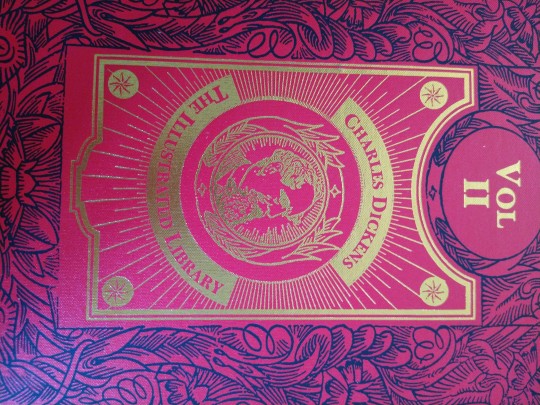
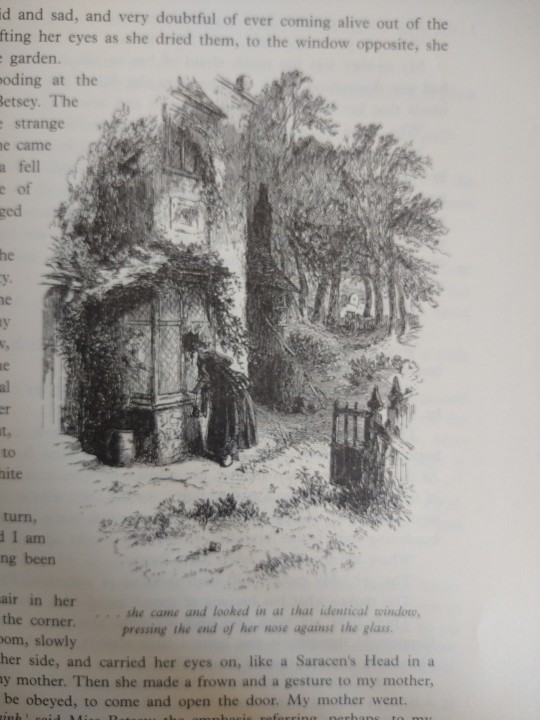
My memory of reading this in my early teens is loving Betsey Trotwood and Wilkins Micawber, but being frustrated by Little Em'ly (the fallen woman) Dora Spenlow (the "child-wife") and Agnes Wickfield (the ministering angel), who all seemed so insipid and limited to me next to the literary heroines I admired - Jane Eyre, Maggie Tulliver, Anne Shirley.
Reading it now with the advantage of several decades, I wonder that I didn't appreciate the minor female characters more, because they are truly wonderful - Rosa Dartle with a scar every bit as expressive as Harry Potter's, Jane Murdstone's fine example of an oppressor in the Simone de Beauvoir mode, and Miss Mowcher - what the hell I made of her when I was 12 I can't think - but there she is, a procuress in plain sight.
I still love Micawber and Aunt Betsy best, but characters I would have hated without reservation are now nuanced to me - none more so than Uriah Heep, who is physically as repulsive to me as he ever was, but now I feel he might have had a point when he says that Copperfield always hated him. The book now reads to me as if he wasn't suffered to rise at least partly because he wasn't of the right class. Like Milady in The Three Musketeers - eventually I must have reached an age when I was less concerned about his crimes and more that he was surrounded by a bunch of entitled snobs.
The description of the storm at Yarmouth and the wreck is as fine as I remember:
As we struggled on, nearer and nearer to the sea, from which this mighty wind was blowing dead on shore, its force became more and more terrific. Long before we saw the sea, its spray was on our lips, and showered salt rain upon us. The water was out, over miles and miles of the flat country adjacent to Yarmouth; and every sheet and puddle lashed its banks, and had its stress of little breakers setting heavily towards us. When we came within sight of the sea, the waves on the horizon, caught at intervals above the rolling abyss, were like glimpses of another shore with towers and buildings. When at last we got into the town, the people came out to their doors, all aslant, and with streaming hair ...
The tremendous sea itself, when I could find sufficient pause to look at it, in the agitation of the blinding wind, the flying stones and sand, and the awful noise, confounded me. As the high watery walls came rolling in, and, at their highest, tumbled into surf, they looked as if the least would engulf the town. As the receding wave swept back with a hoarse roar, it seemed to scoop out deep caves in the beach, as if its purpose were to undermine the earth. When some white–headed billows thundered on, and dashed themselves to pieces before they reached the land, every fragment of the late whole seemed possessed by the full might of its wrath, rushing to be gathered to the composition of another monster. Undulating hills were changed to valleys, undulating valleys (with a solitary storm–bird sometimes skimming through them) were lifted up to hills; masses of water shivered and shook the beach with a booming sound; every shape tumultuously rolled on, as soon as made, to change its shape and place, and beat another shape and place away; the ideal shore on the horizon, with its towers and buildings, rose and fell; the clouds fell fast and thick; I seemed to see a rending and upheaving of all nature ...
One mast was broken short off, six or eight feet from the deck, and lay over the side, entangled in a maze of sail and rigging; and all that ruin, as the ship rolled and beat—which she did without a moment's pause, and with a violence quite inconceivable—beat the side as if it would stave it in. Some efforts were even then being made, to cut this portion of the wreck away; for, as the ship, which was broadside on, turned towards us in her rolling, I plainly descried her people at work with axes, especially one active figure with long curling hair, conspicuous among the rest. But a great cry, which was audible even above the wind and water, rose from the shore at this moment; the sea, sweeping over the rolling wreck, made a clean breach, and carried men, spars, casks, planks, bulwarks, heaps of such toys, into the boiling surge.
Last words to my favourites:
Ilsa is as sharp as Betsey Trotwood, if not as discreet:
'I think Agnes is going to be married.'
'God bless her!' said I, cheerfully.
'God bless her!' said my aunt, 'and her husband too!'
"And now, in short, I proceed to devour that inestimable volume, The Shrieking Pit by Arthur Rees, and if any remain to accompany me on this literary pilgrimage, in due course here shall be found such ruined vestiges as yet
Remain
Of
A
Fallen Tower"
105 (with apologies to Wilkins Micawber)
2 notes
·
View notes
Link
#19.Jahrhundert#Arbeit#deutsch#England#Gefängnis#Geld#Gesellschaft#Kinderarbeit#London#Schulden#Viktorianismus
0 notes
Text
Can you recall any works of fiction you’ve read that has a character with a life altering congenital physical defect? My short list:
Philip Carey’s club foot - Of Human Bondage by W. Somerset Maugham
Philip Wakem’s hunch back - The Mill on the Floss by George Eliot
Calliope/Cal Stephanides’s ambiguous genitalia - Middlesex by Jeffrey Eugenides
Prue Sarn’s cleft lip - Precious Bane by Mary Webb
The lame Tiny Tim in A Christmas Carol by Charles Dickens
The lame Laura Wingfield in The Glass Menagerie by Tennessee Williams
Miss Mowcher’s dwarfism in David Copperfield by Charles Dickens
Charles Bovary’s patient with a club foot in Madame Bovary by Gustave Flaubert.
1 note
·
View note
Text
Can David Copperfield adaptations start doing two things please?
1) Include the whole subplot of just how awful Steerforth is, including the characters of Rosa, Littimer, and Miss Mowcher (who NEVER made it into any adaptations as far as I’m aware)
2) Stop casting the same actress as both David’s mother and his first wife, that’s something of a tradition apparently because multiple versions have done that including the most recent one starring Dev Patel from 2019, but can we just agree that it’s creepy and stop it?
5 notes
·
View notes
Photo
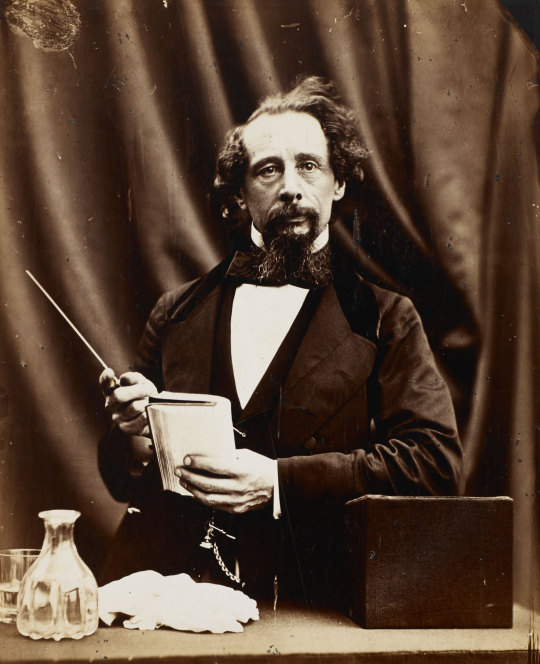
Arrivals & Departures
07 February 1812 – 09 June 1870
Celebrate Charles John Huffam Dickens Day!
Charles John Huffam Dickens FRSA (/ˈdɪkɪnz/; 07 February 1812 – 09 June 1870) was an English writer and social critic. He created some of the world's best-known fictional characters and is regarded by many as the greatest novelist of the Victorian era. His works enjoyed unprecedented popularity during his lifetime, and by the 20th century, critics and scholars had recognised him as a literary genius. His novels and short stories are still widely read today.
Born in Portsmouth, Dickens left school to work in a factory when his father was incarcerated in a debtors' prison. Despite his lack of formal education, he edited a weekly journal for 20 years, wrote 15 novels, five novellas, hundreds of short stories and non-fiction articles, lectured and performed readings extensively, was an indefatigable letter writer, and campaigned vigorously for children's rights, education, and other social reforms.
Dickens's literary success began with the 1836 serial publication of The Pickwick Papers. Within a few years he had become an international literary celebrity, famous for his humor, satire, and keen observation of character and society. His novels, most published in monthly or weekly installments, pioneered the serial publication of narrative fiction, which became the dominant Victorian mode for novel publication. Cliffhanger endings in his serial publications kept readers in suspense. The installment format allowed Dickens to evaluate his audience's reaction, and he often modified his plot and character development based on such feedback. For example, when his wife's chiropodist expressed distress at the way Miss Mowcher in David Copperfield seemed to reflect her disabilities, Dickens improved the character with positive features. His plots were carefully constructed, and he often wove elements from topical events into his narratives. Masses of the illiterate poor chipped in ha'pennies to have each new monthly episode read to them, opening up and inspiring a new class of readers.
His 1843 novella A Christmas Carol remains especially popular and continues to inspire adaptations in every artistic genre. Oliver Twist and Great Expectations are also frequently adapted and, like many of his novels, evoke images of early Victorian London. His 1859 novel A Tale of Two Cities (set in London and Paris) is his best-known work of historical fiction. The most famous celebrity of his era, he undertook in response to public demand, a series of public reading tours in the later part of his career. Dickens has been praised by many of his fellow writers—from Leo Tolstoy to George Orwell, G. K. Chesterton, and Tom Wolfe—for his realism, comedy, prose style, unique characterizations, and social criticism. However, Oscar Wilde, Henry James, and Virginia Woolf complained of a lack of psychological depth, loose writing, and a vein of sentimentalism.
The term Dickensian is used to describe something that is reminiscent of Dickens and his writings, such as poor social conditions or comically repulsive characters.
1 note
·
View note
Photo
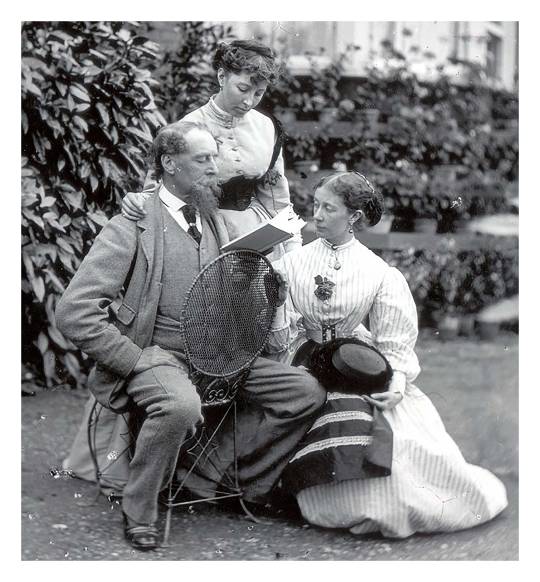
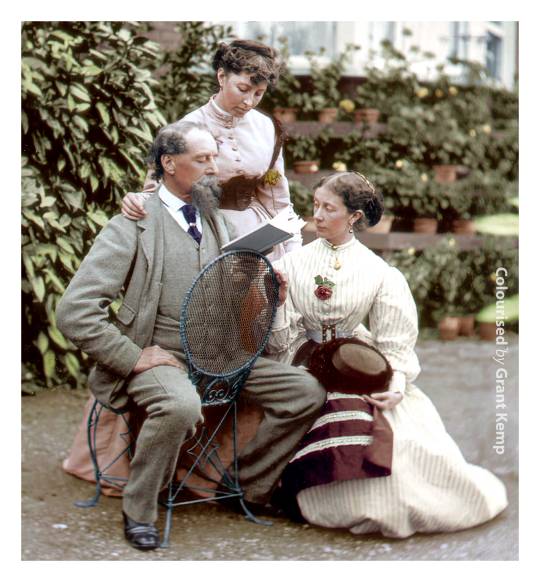
Born 208 years ago today, 7th February 1812, Charles John Huffam Dickens was an English writer and social critic. He created some of the world's best-known fictional characters and is regarded by many as the greatest novelist of the Victorian era. His works enjoyed unprecedented popularity during his lifetime, and by the 20th century, critics and scholars had recognised him as a literary genius. His novels and short stories are still widely read today.
Born in Portsmouth, Dickens left school to work in a factory when his father was incarcerated in a debtors' prison. Despite his lack of formal education, he edited a weekly journal for 20 years, wrote 15 novels, five novellas, hundreds of short stories and non-fiction articles, lectured and performed readings extensively, was an indefatigable letter writer, and campaigned vigorously for children's rights, education, and other social reforms.
Dickens's literary success began with the 1836 serial publication of The Pickwick Papers. Within a few years he had become an international literary celebrity, famous for his humour, satire, and keen observation of character and society. His novels, most published in monthly or weekly instalments, pioneered the serial publication of narrative fiction, which became the dominant Victorian mode for novel publication. Cliffhanger endings in his serial publications kept readers in suspense. The installment format allowed Dickens to evaluate his audience's reaction, and he often modified his plot and character development based on such feedback. For example, when his wife's chiropodist expressed distress at the way Miss Mowcher in David Copperfield seemed to reflect her disabilities, Dickens improved the character with positive features. His plots were carefully constructed, and he often wove elements from topical events into his narratives. Masses of the illiterate poor chipped in ha'pennies to have each new monthly episode read to them, opening up and inspiring a new class of readers.
His 1843 novella A Christmas Carol remains especially popular and continues to inspire adaptations in every artistic genre. Oliver Twist and Great Expectations are also frequently adapted and, like many of his novels, evoke images of early Victorian London. His 1859 novel A Tale of Two Cities (set in London and Paris) is his best-known work of historical fiction. The most famous celebrity of his era, he undertook in response to public demand, a series of public reading tours in the later part of his career. Dickens has been praised by many of his fellow writers, from Leo Tolstoy to George Orwell, G. K. Chesterton, and Tom Wolfe for his realism, comedy, prose style, unique characterisations, and social criticism.
On 8 June 1870, Dickens suffered a stroke at his home after a full day's work on Edwin Drood. He never regained consciousness, and the next day, he died at Gads Hill Place. Biographer Claire Tomalin has suggested Dickens was actually in Peckham when he suffered the stroke, and his mistress Ellen Ternan and her maids had him taken back to Gad's Hill so the public would not know the truth about their relationship. Contrary to his wish to be buried at Rochester Cathedral "in an inexpensive, unostentatious, and strictly private manner", he was laid to rest in the Poets' Corner of Westminster Abbey.
A printed epitaph circulated at the time of the funeral reads:
"To the Memory of Charles Dickens (England's most popular author) who died at his residence, Higham, near Rochester, Kent, 9 June 1870, aged 58 years. He was a sympathiser with the poor, the suffering, and the oppressed; and by his death, one of England's greatest writers is lost to the world."
The term Dickensian is used to describe something that is reminiscent of Dickens and his writings, such as poor social conditions or comically repulsive characters.
Dickens is credited by the Oxford English Dictionary with introducing no less than 247 new words and usages into the language including “butter-fingers”, “fluffiness” and the verb “to manslaughter”.
This is my colourised version of a black & white picture taken in 1865, and showing Dickens with his daughters, Catherine "Katey" Dickens and Mary "Mamie" Dickens.
Restoring Your Past … Website
Restoring Your Past … on Facebook
#Dickens#Victorian#author#writer#novelist#Oliver Twist#Nicholas Nickleby#The Old Curiosity Shop#Martin Chuzzlewit#Dombey and Son#David Copperfield#Little Dorrit#A Tale of Two Cities#Great Expectations#The Mystery of Edwin Drood#history#vintage#Colourisation#Colorization#photo colorization#photo colourisation
0 notes
Text
book review in literature
David Copperfield by: Charles Dickens
The novel traces the life of David Copperfield from the time of his birth to his mature manhood, when he is married and familiar with the vicissitudes of life. His early years are enjoyable with his mother who was widowed shortly before his birth and with her servant, Peggotty. Life is happy for David until his mother decides to marry Mr. Murdstone; afterward, life becomes unbearable for David. He is soon sent to a miserable school where he becomes friendly with James Steerforth, a fellow student.
When David's mother dies, he is taken from school and put to work by Mr. Murdstone in a London warehouse. Although David enjoys the company of the impoverished Micawber family, with whom he boards, his other associates and the work are intolerable, so, without money or property, he runs away to his Aunt Betsey Trotwood in Dover. Despite a stern exterior, Aunt Betsey treats him well, adopting him and sending him to a good school. While at school, he boards with a Mr. Wickfield and his daughter Agnes. After graduation, David works in the law office of Spenlow & Jorkins and soon falls in love with Mr. Spenlow's daughter, Dora.
About this time, Em'ly, the Peggottys' beloved niece, runs off to marry Steerforth, whom David had innocently introduced to her while she was engaged to Ham, a nephew of the Peggottys. The family is saddened by this development, but Mr. Peggotty sets out to find her and bring her back. David uses his spare time doing clerical and literary work to help Aunt Betsey, who now finds herself without financial resources. He marries Dora, only to find that he has a "child-wife" who knows nothing of housekeeping and cannot accept any responsibility.
Meanwhile, Uriah Heep, an "umble" clerk in Mr. Wickfield's employ, whom David dislikes, has deceitfully worked his way into a partnership, aided by Mr. Wickfield's weakness for wine. In addition, David also discovers that his old friend Mr. Micawber has gone to work for Heep. David has remained fond of the Micawbers, and it troubles him that his old friend is working for a scoundrel. Eventually, however, Micawber has a grand moment of glory when he exposes Heep as a fraud, helping to save Mr. Wickfield and restoring some of Aunt Betsey's finances.
David's wife, Dora, becomes ill and dies, and David is troubled until Em'ly, the Peggottys' niece, returns to her uncle. David has felt guilty for some time for having introduced Em'ly to Steerforth. After a reconciliation is accomplished, Em'ly, along with some of the Peggottys, and the Micawbers leave for Australia to begin new lives. Before they leave, David witnesses a dramatic shipwreck in which Steerforth is killed, as is Ham in attempting to rescue him. Still saddened by the loss of his wife and other events, David goes abroad for three years. It is only after he returns that he realizes that Agnes Wickfield has been his true love all along, and their happy marriage takes place at last.
For me, the book that I read which is the David Copperfield by: Charles Dickens it a little boring because reading novel is not in my forte. I must prefer to watch movies than to reading novels book, or maybe I must choose to read fictional books than novels.
David Copperfield He is the central character in the novel and tells the story of his life from birth to adulthood. David first marries Dora Spenlow, an empty-headed young girl; afterward, he realizes how incompatible they really are. When Dora dies, he marries Agnes Wickfield and by the novel's end, he has matured into a successful writer and adult.
Clara Copperfield David's mother. She is an attractive, tender person, but impractical and emotional and easily taken in by Mr. Murdstone, who marries her because he is interested in her annuity.
Clara Peggotty The Copperfields' housekeeper, who also acts as David's nurse. She is a woman of intense loyalty and is David's only companion after his mother's death. Edward Murdstone David's stepfather. A dark, handsome man who cruelly beats David and slowly drives David's mother to an early death.
Jane Murdstone Mr. Murdstone's sister. She runs the Copperfield household and incessantly harasses David.Mr. Barkis The driver of the horse-cart that travels between Yarmouth and David's home, He is a shy, quiet man who uses David as a messenger in his courtship of Peggotty.Mr. Chillip The doctor who delivers David. He is an exceedingly mildmannered, frightened little man who is especially afraid of David's aunt, Betsey Trotwood.
Daniel Peggotty Clara Peggotty's brother and a Yarmouth fisherman. He is a warm-hearted man whose house is a refuge for anyone who needs help.Ham Peggotty Mr. Peggotty's orphaned nephew. Ham, like his uncle, is a considerate, kindly person. He is in love with Em'ly and waits patiently for her after she runs away. He finally dies in an attempt to save Steerforth, Em'ly's seducer.Little Em'ly Mr. Peggotty's orphaned niece. She is David's childhood sweetheart, but becomes engaged to Ham and later runs away with Steerforth. She is a quiet, compassionate young girl who wants to become a "lady," a desire that leads to unhappiness.
Mrs. Gummidge The widow of Mr. Peggotty's partner. She constantly complains about her hardships, but when Em'ly runs away, she changes into a helpful, inspiring confidante of Mr. Peggotty.Charles Mell A schoolmaster at the Salem House boarding school. A gentle friend and teacher of David.Mr. Creakle The sadistic headmaster of the Salem House School. He is a fiery-faced man who enjoys flogging the boys with a cane. He later becomes a prison magistrate.Mr. Tungay The assistant and cruel companion of Mr. Creakle. He has a wooden leg and repeats everything that Creakle says.James Steerforth A spoiled young man whom David admires. He has a surface polish and the good manners that deceive people who do not know him. His true selfishness is shown when he deserts Em'ly, leaving her with his servant, Littimer. He is killed in a storm off Yarmouth along with Ham, who tries to save him.Tommy Traddles David's friend. Of all the boys at the Salem House School, Traddies receives the most punishment. He is a good-natured, loyal friend to both David and Mr. Micawber. Traddles is persistent, and this quality helps him rise from his humble background to become a judge.Wilkins Micawber A constantly impoverished, but always optimistic, gentleman who boards David during his stay in London. He is a broad comic character with a passion for writing flowery letters and uttering grandiloquent speeches. He finally accompanies Mr. Peggotty to Australia, where he becomes a successful magistrate.
Emma Micawber Mr. Micawber's long-suffering wife. She stands by her husband through all his hardships, even joining him in debtors' prison.Betsey Trotwood David's great-aunt. She is unhappy that David was born a boy instead of a girl, but later she acts as his guardian and provider during his early years of schooling. Her formal, often brisk, nature is deceiving; she is basically a sympathetic person.
Richard Babley A lovable simpleton cared for by Betsey Trotwood. He is engaged in writing a long manuscript that he uses to paper a huge kite. Mr. *** is devoted to David's aunt and becomes a great friend of David's.Uriah Heep A repulsive, scheming young man who attempts to marry Agnes Wickfield and gain control of her father's law practice. He pretends to be humble and uses this as a means to gain vindictive revenge on people he believes have snubbed him. He is exposed by Mr. Micawber and ends up in prison.Mr. Wickfield A solicitor and the widowed father of Agnes Wickfield. He is a proud man, but his excessive drinking allows Uriah Heep to take advantage of him.
Agnes Wickfield The daughter of Mr. Wickfield; David's second wife. She is a dutiful companion and housekeeper to her father and a sisterly friend to David while he stays at the Wickfield house. She proves to be a perfect wife and an inspiration to David in his writing.Dr. Strong The headmaster of the school which David attends in Canterbury. He is a scholarly, trusting gentleman who is married to a girl much younger than himself. Although his wife is accused of infidelity, he maintains his faith in her.Annie Strong Dr. Strong's youthful wife. She is a beautiful, affectionate girl whose family exploits her husband.
Jack Maldon Annie Strong's cousin. He is a lazy, vain young man who tries to compromise Mrs. Strong, but is repulsed.Mrs. Markleham Annie Strong's mother. A forceful, selfish woman, she always takes Jack Maldon's part and unwittingly helps cause the misunderstanding between her daughter and Dr. Strong.Mrs. Steerforth James Steerforth's mother. A possessive woman who has spoiled her son by over-indulgence and a smothering affection. she lapses into a semi-invalid state when she hears of her son's death.Rosa Dartle Mrs. Steerforth's companion. She is a neurotic, quick-tempered young woman with a consuming love for Steerforth.Littimer Steerforth's personal manservant. He is a formal, haughty person who has an air of respectability, yet he aids Steerforth in his seduction of Em'ly. He is trapped by Miss Mowcher and is sent to Creakle's prison.
Miss Mowcher A middle-aged dwarf who is a hairdresser for wealthy families. She is upset when she realizes that she was duped into helping Steerforth run off with Em'ly, and is instrumental in the capture of Littimer, who aided Steerforth.Martha Endell Em'ly's friend. She is a suffering woman who is forced to go to London to hide her shame. Martha redeems herself by saving Em'ly from a similar life and finds happiness in her own life after she arrives in Australia.Mr. Spenlow A proctor and partner in a law firm in Doctor's Commons. He is a pompous, aristocratic lawyer who objects to David's plans to marry his daughter.
Dora Spenlow David's first wife. She is an impractical, empty-headed girl who cannot cook or manage a household. Although she is a poor selection as a wife, David is so taken by her childlike beauty that he overlooks her faults and marries her. Their marriage is a comedy of mismanagement until Dora dies, leaving David free to marry the domestically perfect Agnes.Mr. Omer The Yarmouth undertaker and dealer in funeral clothes.Minnie Omer Mr. Omer's daughter and Em'ly's working companion.
Joram Minnie Omer's sweetheart and eventually her husband, and finally, Mr. Omer's business partner.Mr. Quinion A business associate of Mr. Murdstone.Janet Betsey Trotwood's housekeeper. She assists Miss Trotwood in chasing donkey riders off the lawn.Mr. Jorkins Mr. Spenlow's seldom-seen partner. He is reputed to be a strict businessman, but he is really a mild-mannered individual whose name is used to frighten new employees.Julia Mills Dora's girl friend. She is a romantic person who advises David in his courtship with Dora.Mrs. Crupp David's landlady. She is a lazy woman who drinks David's brandy and feuds with Aunt Betsey.Sophy Crewler Traddies' sweetheart. A patient girl from a large family, she marries Traddies and assists him in his work as a lawyer.
The main character change didn’t change because until the end he remain the same character which is David Copperfield.
The plot engaging didn’t interest because as what I have said before, novel is really boring.
The main idea theme is all about the life of David Copperfield . on how he first marry. And then in the end he marry again because his first wife died, after his first wife died he found his one true and he got marry again.
The passage strike me as insightful is the part which David witnesses a dramatic shipwreck in which Steerforth is killed, as is Ham in attempting to rescue him. Still saddened by the loss of his wife and other events, David goes abroad for three years. It is only after he returns that he realizes that Agnes Wickfield has been his true love all along, and their happy marriage takes place at last.
The ending its really satisfy me. Because when David realize that agnes is his true all along. And then he marry agnes then they live happily ever after.
If I could as the author a question, I will ask him why he choose to wrote this kind of novel? Then what really inspired him by writing on it?. I never read the others story of the author that he wrote because as what I have said before I really hate reading novel books.
And in the end the story never change my perspective.
0 notes
Quote
'Come!' said she, accepting the offer of my hand to help her over the fender, and looking wistfully up into my face, 'you know you wouldn't mistrust me, if I was a full-sized woman!'
I felt that there was much truth in this; and I felt rather ashamed of myself.
'You are a young man,' she said, nodding. 'Take a word of advice, even from three foot nothing. Try not to associate bodily defects with mental, my good friend, except for a solid reason.'
David Copperfield, Charles Dickens
2 notes
·
View notes
Quote
If I am a plaything for you giants, be gentle with me.
C. Dickens in D. Copperfield
8 notes
·
View notes
Link
#19.Jahrhundert#Arbeit#deutsch#England#Gefängnis#Geld#Gesellschaft#Kinderarbeit#London#Schulden#Viktorianismus
0 notes
Photo
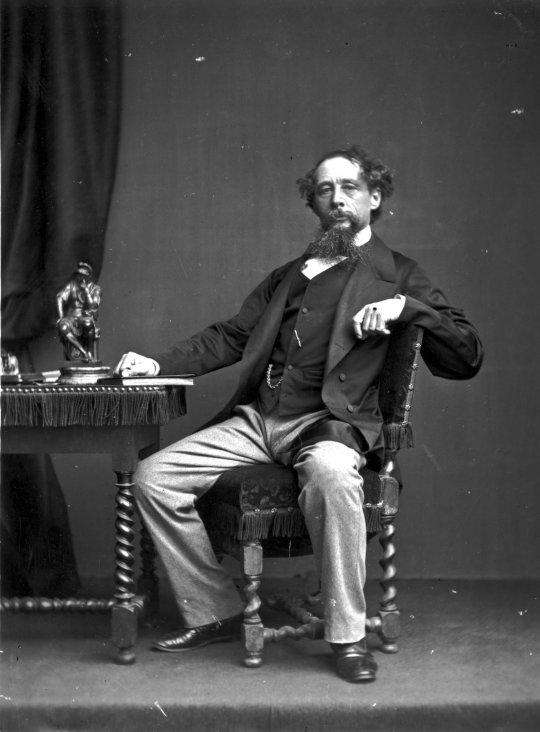
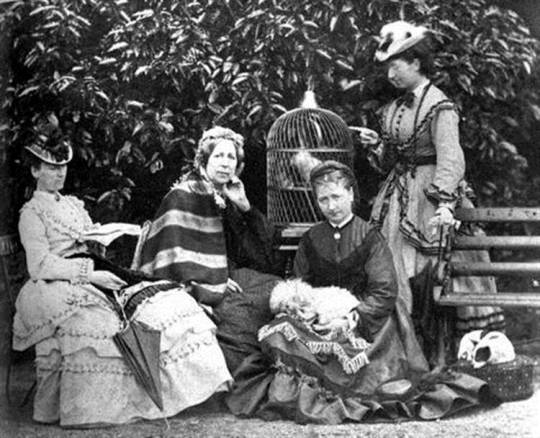
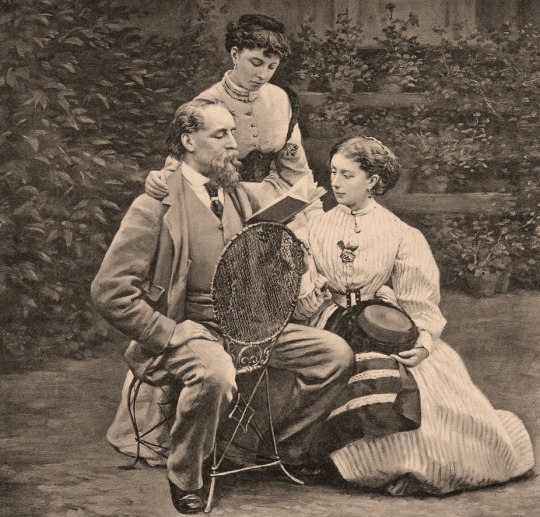
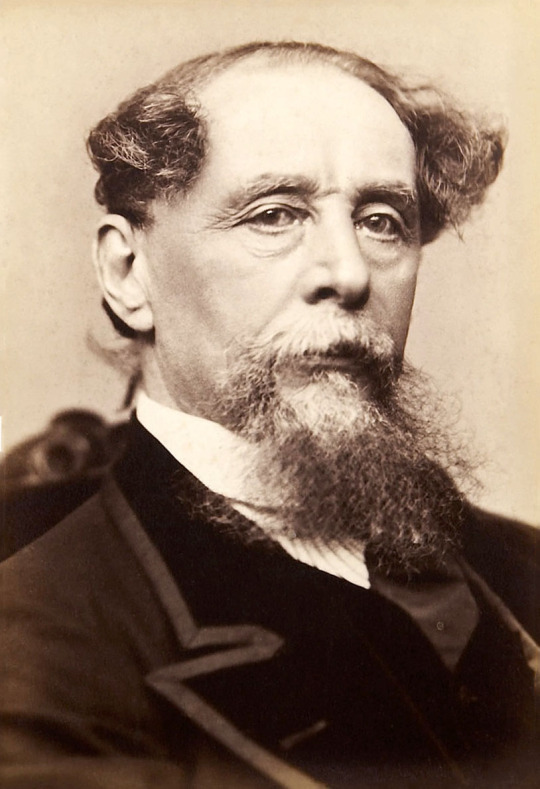
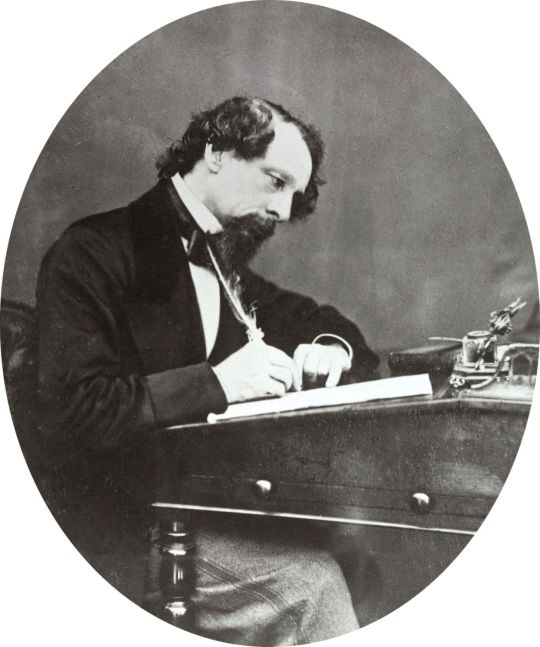
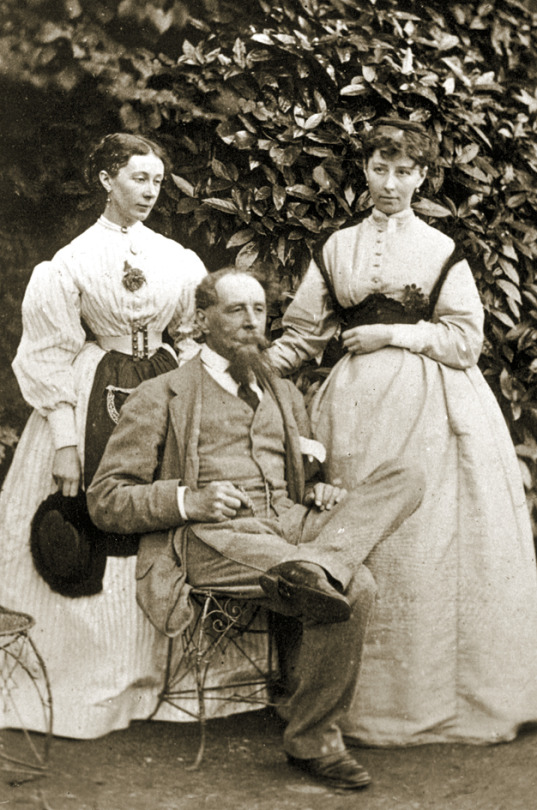
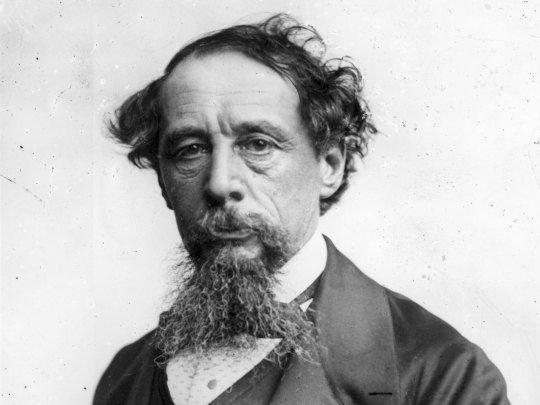
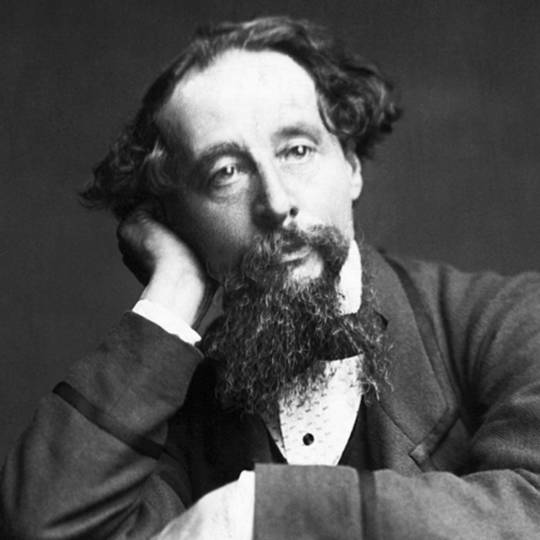
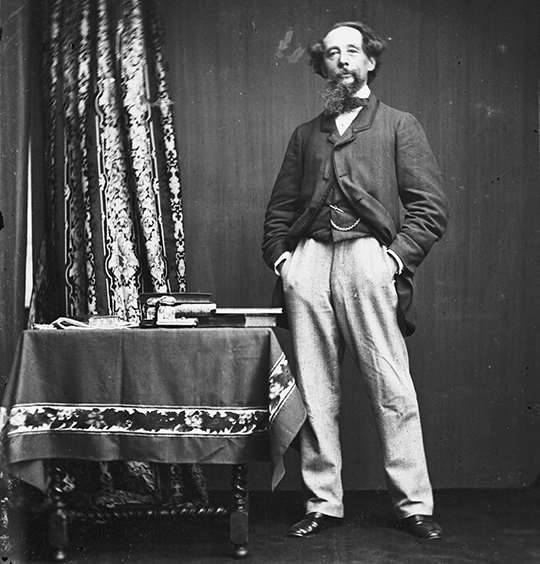
Arrivals & Departures
07 February 1812 – 09 June 1870
Charles John Huffam Dickens FRSA
Charles John Huffam Dickens FRSA (/ˈdɪkɪnz/) was an English writer and social critic. He created some of the world's best-known fictional characters and is regarded by many as the greatest novelist of the Victorian era. His works enjoyed unprecedented popularity during his lifetime and, by the 20th century, critics and scholars had recognised him as a literary genius. His novels and short stories are widely read today.
Born in Portsmouth, Dickens left school at the age of 12 to work in a boot-blacking factory when his father was incarcerated in a debtors' prison. After three years he was returned to school, before he began his literary career as a journalist. Dickens edited a weekly journal for 20 years, wrote 15 novels, five novellas, hundreds of short stories and non-fiction articles, lectured and performed readings extensively, was an indefatigable letter writer, and campaigned vigorously for children's rights, education and other social reforms.
Dickens's literary success began with the 1836 serial publication of The Pickwick Papers, a publishing phenomenon—thanks largely to the introduction of the character Sam Weller in the fourth episode—that sparked Pickwick merchandise and spin-offs. Within a few years Dickens had become an international literary celebrity, famous for his humour, satire and keen observation of character and society. His novels, most of them published in monthly or weekly instalments, pioneered the serial publication of narrative fiction, which became the dominant Victorian mode for novel publication. Cliffhanger endings in his serial publications kept readers in suspense. The instalment format allowed Dickens to evaluate his audience's reaction, and he often modified his plot and character development based on such feedback. For example, when his wife's chiropodist expressed distress at the way Miss Mowcher in David Copperfield seemed to reflect her disabilities, Dickens improved the character with positive features. His plots were carefully constructed and he often wove elements from topical events into his narratives. Masses of the illiterate poor would individually pay a halfpenny to have each new monthly episode read to them, opening up and inspiring a new class of readers.
His 1843 novella A Christmas Carol remains especially popular and continues to inspire adaptations in every artistic genre. Oliver Twist and Great Expectations are also frequently adapted and, like many of his novels, evoke images of early Victorian London. His 1859 novel A Tale of Two Cities (set in London and Paris) is his best-known work of historical fiction. The most famous celebrity of his era, he undertook, in response to public demand, a series of public reading tours in the later part of his career. The term Dickensian is used to describe something that is reminiscent of Dickens and his writings, such as poor social or working conditions, or comically repulsive characters.
1 note
·
View note